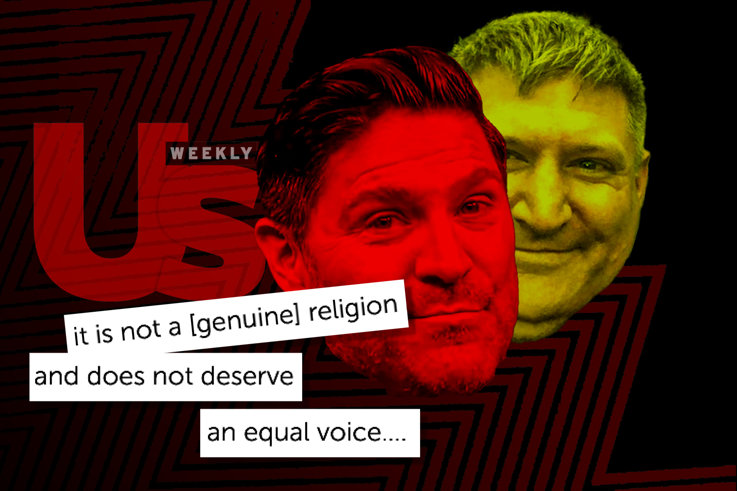
-
HOME
-
WHAT IS STANDOur Mission Our Values Our Help Contact
-
WHAT WE FIGHT FORReligious Freedom Religious Literacy Equality & Human Rights Inclusion & Respect Free Speech Responsible Journalism Corporate Accountability
-
RESOURCESExpert Studies Landmark Decisions White Papers FAQs David Miscavige Religious Freedom Resource Center Freedom of Religion & Human Rights Topic Index Priest-Penitent Privilege Islamophobia
-
HATE MONITORBiased Media Propagandists Hatemongers False Experts Hate Monitor Blog
-
NEWSROOMNews Media Watch Videos Blog
-
TAKE ACTIONCombat Hate & Discrimination Champion Freedom of Religion Demand Accountability
Dan Wakeford Uses Us Weekly as a Pulpit to Promote Raw Anti-Religious Hate
Employing rhetoric chillingly reminiscent of 20th-century propaganda designed to marginalize and dehumanize minority faiths, Dan Wakeford’s tabloid recently declared that Scientology—a globally recognized religion—“is not a genuine religion” and “does not deserve an equal voice.”

This appalling display of discrimination, published in Wakeford’s June 16 issue of Us Weekly, is no surprise to those familiar with Wakeford’s record. The editor, who self-identifies first as a “brand builder” on his LinkedIn profile, has spent much of his career offering brand-building services to virulent anti-Scientologists—extremists like Marc Headley, a documented embezzler, violent abuser of women and proud member of the cyberterrorist hate collective Anonymous.
In his tabloid’s latest anti-religious “reporting,” Wakeford not only conspired to conceal his source’s disqualifying background, but also failed to disclose a flagrant conflict of interest.
After stealing $15,490 from the Church, Headley filed a vexatious anti-Scientology lawsuit that was thrown out on summary judgment—a ruling unanimously upheld by the Ninth Circuit Court of Appeals. The case was such a transparent act of harassment that the court ordered Headley and his wife to pay the Church $42,000 in legal costs.
Yet 13 years after a panel of federal judges rejected Headley’s scandalous allegations as unfounded—concluding, “The record overwhelmingly shows that the Headleys joined and voluntarily worked for [the Church] because they believed that it was the right thing to do, because they enjoyed it”—Wakeford continues to elevate those same debunked allegations and Headley himself, in spite of Headley being thoroughly discredited more than a decade ago.
As the court found: “Marc left [the Church] in January 2005 after being told that he was under investigation for embezzlement.”
But in his tabloid’s latest anti-religious “reporting,” Wakeford not only conspired to conceal this source’s disqualifying background, he also failed to disclose a flagrant conflict of interest: Headley admitted under oath to being paid by the company that owned tabloids overseen by Wakeford to supply them anti-Scientology content.
That Wakeford would allow his publication, which brands itself as “a priority destination and trusted source” for pop culture, to declare that members of a religion do not “deserve an equal voice” exposes how consumed he is by his own anti-Scientology bigotry—and how profoundly disconnected he is from the culture he claims to represent.
The point is underscored by the public’s resounding rejection: the promotional video Wakeford produced touting his anti-religious cover story failed to attract even 800 views over more than two weeks.
As perhaps the last stronghold of blatant hate in the American mainstream, Us Weekly—under Wakeford’s leadership—has morphed from an entertainment outlet into a bullhorn blaring content that “entertains” only one audience: bigots.









